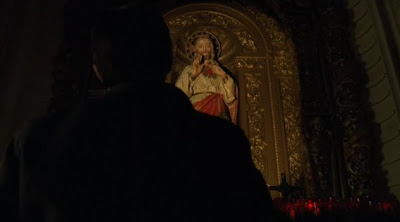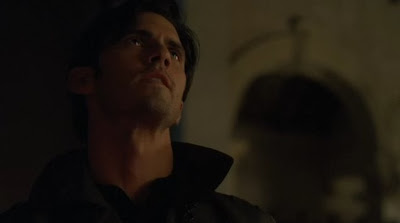
In a recent episode of NBC's Heroes, Peter and his mother Angela have escaped those who are pursuing them and taken refuge in a church. Peter leaves Angela alone in the pews, and ends up at the foot a statue of Jesus standing above a collection of candles. He lights one and stares up at the statue.Heroes is a series that often brings God-talk into open spaces, but in this week’s episode, it’s like someone turned on a spigot of it—particularly in the scenes with Peter and Angela.
Peter: I asked to be extraordinary and I promised to make the world a better place. So, when I got my chance, I lived up to my end of the bargain.
He stares up at the figure of Jesus again.
Peter: For what? I’m running for my life. A lot of people are running for their lives. They’re hurt and they’re dying and I can’t . . . help them. Do you even care what you put people through? I mean, when I kneel here—
He gets on his knees, looking up at the statue of Jesus.
Peter: —before you and I ask for help, do you even listen? And I’m tired of fighting. And I’m angry. I’m angry at my father, Nathan . . .
He looks over his shoulder at Angela praying in the pew behind him.
Peter: . . . and my mother.
He looks up again at the statue.
Peter: At you. We had a deal. I think it’s about time you lived up to your end. Please, just . . . show up.
In “Into Asylum,” we pick up with the two right where the last episode let off, with Peter flying his mother Angela away from those who are hunting them and to temporary safety—which turns out to be a church Angela has connections to. Angela is at the end of rope; her power comes in her dreams, and she hasn’t been able to truly sleep in a very long time. It is here she hopes to find rest and direction on what to do next.
 Interestingly, both mother and son are wrestling with their own demons, so to speak. Angela must sleep in order to access her power, but sleep doesn’t come easy. She is feeling the weight of the choices she’s made over the years—including those that have hurt her sons. It turns out that only after she confesses those choices is she able sleep the first solid sleep she’s had in years. And interestingly, her most pointed confessions occur to Peter as they hiding in a confessional.
Interestingly, both mother and son are wrestling with their own demons, so to speak. Angela must sleep in order to access her power, but sleep doesn’t come easy. She is feeling the weight of the choices she’s made over the years—including those that have hurt her sons. It turns out that only after she confesses those choices is she able sleep the first solid sleep she’s had in years. And interestingly, her most pointed confessions occur to Peter as they hiding in a confessional. As Angela grapples with her own issues, Peter wrestles with his in the above scene. To be honest, I couldn’t help but resonate with Peter’s prayer—if only because it is so familiar. It is similar in many ways to the prayers uttered by those who wrestle with darkness and suffering and evil. We try to make sense of it all, why God would let people suffer or darkness prevail. We try to bargain, set up a deal or claim his end of one we thought we’d made. We try to argue God into action, expressing our anger and frustration, our fear that he isn’t there—or worse, that he doesn’t care.
As Angela grapples with her own issues, Peter wrestles with his in the above scene. To be honest, I couldn’t help but resonate with Peter’s prayer—if only because it is so familiar. It is similar in many ways to the prayers uttered by those who wrestle with darkness and suffering and evil. We try to make sense of it all, why God would let people suffer or darkness prevail. We try to bargain, set up a deal or claim his end of one we thought we’d made. We try to argue God into action, expressing our anger and frustration, our fear that he isn’t there—or worse, that he doesn’t care.In the end, however, like Peter we just want God to “show up.” We want to know he exists—and that he’s good.
The thing is, if Scripture is true, God never left. He’s always been there and always will. And he is good—always working to restore, redeem and bring life to a broken world and people. The problem is that sometimes, as in Peter’s case, everything around us screams otherwise, and that makes it difficult to maintain and act out of faith that God is there and good.
It becomes even more difficult when, in that darkness, we don’t get an answer to our questions about evil and suffering, of why God chooses to rescue some in the here-and-now and not others. And that is one of the more difficult aspects of faith, one Ken aptly explores in his reflections on the series finale of Battlestar Galactica:
It is fundamental to biblical religion that God chooses, and not particularly fairly either. Of all the families of humanity, he choose only Abraham and Sarah to reveal himself to. Of all the enslaved peoples of the earth, he rescued only Israel (and at the expense of the Egyptians and the Canaanites). Of all the times and places he could have come in the flesh, he chose 1st century Palestine–and 1st century Palestine alone. The God of the Bible is a God who heals some diseases, but not others, who raises the dead on occasion, but (until kingdom come) not as a general rule.There are times in darkness when God does act in ways that bear out his presence and goodness and bolster our faith and trust in him. Sometimes, in my experience, that act is what I was hoping for. But more often than not, that revelation isn’t what I expect, but more like God’s response to Job. For, if Scripture is right, God doesn’t reveal himself in order to hold up his end of some supposed bargain, answer our charges or prove anything; he reveals himself because he is God—and, amazingly, he loves us. And strangely enough, like Job, I am beginning to learn that can be enough.
. . . . God will choose what God will choose, and more often than not, he chooses those who least deserve it. But however much we may struggle to understand this, it is precisely the unfairness of God that offers hope. For whether God chooses or not, we do, and much of the time, we choose poorly. More like Gaius Baltar than we’d like to admit, we tend towards self-interest and narcissism. We ignore the pain of others and let ourselves be drawn into evils far beyond our control. Thus, a God who always gave everyone what they deserved would be a God who could never redeem us, for none of us deserve it. A God who remained eternally “beyond good and evil” would never lead a crew of misfit Colonials and Cylons to Earth, and he would certainly never take on flesh and die to bring us life. For that too is central to biblical religion, and–like the Colonials whose sordid lives were never whitewashed on BSG–we can only be thankful for that, even if we can never understand it.
And on another note, the irony of Peter’s prayer (and, I must admit, many of my own) is that he is laying out fears and charges of abandonment and indifference at the feet of One who changed the world for the better even as he too was hunted, abandoned, tortured and executed in the most horrible of ways. Jesus knows suffering and has experienced the darkness of evil first-hand. And that is something we tend to forget in our darkness and suffering.
In Peter’s case, God does show up in ways that bolster his faith. They elude their captors and his mother receives guidance and clarity. I appreciate that these divine acts are preceded by Angela’s authentic confessions and Peter’s emotionally honest prayer to God. It not only points to a God who welcomes us right where we’re at (struggling with doubt, anger and the darkness in ourselves and the world around us) but also one who cares and intervenes in deeply personal ways in our lives.
But we must keep in mind that classic observation that God is not a vending machine—put confession and prayer “in” and get exactly what you want “out.” God is so oh-so-much more than that. And, more often than not, it’ll feel like we don’t have a clue as to what he’s doing or why he’s doing it in a particular situation.
But we can have faith that he’s working everything—even death and darkness—towards restoration, redemption and life. The whole of creation, as Paul puts it, is working towards this:
All around us we observe a pregnant creation. The difficult times of pain throughout the world are simply birth pangs. But it's not only around us; it's within us. The Spirit of God is arousing us within. We're also feeling the birth pangs. These sterile and barren bodies of ours are yearning for full deliverance. That is why waiting does not diminish us, any more than waiting diminishes a pregnant mother. We are enlarged in the waiting. We, of course, don't see what is enlarging us. But the longer we wait, the larger we become, and the more joyful our expectancy.As we step out in trust that God is who he says and can do what he says (even in the darkness when all else seems otherwise), he does reveal himself in deep and personal ways. He wants to be known. It may not be as we expect, but more often than not, it is more than enough.
Meanwhile, the moment we get tired in the waiting, God's Spirit is right alongside helping us along. If we don't know how or what to pray, it doesn't matter. He does our praying in and for us, making prayer out of our wordless sighs, our aching groans. He knows us far better than we know ourselves, knows our pregnant condition, and keeps us present before God. That's why we can be so sure that every detail in our lives of love for God is worked into something good.
And, while there’s lots more that could be explored in this episode, I’m thinking that’s more than enough God-talk in these open spaces, heh.
(Images: NBC) heroesctgy